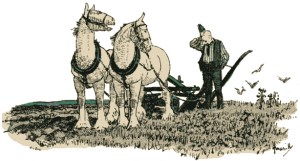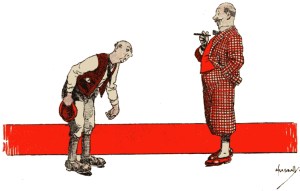< Previous |
Index |
Next > |
Joe Ramsbottom
by Marriott Edgar
Illustrations by John Hassall

Bird brain
Joe Ramsbottom is another poem of Edgar's that includes a term rapidly disappearing from the Northern English language: 'gormless', a gentle form of bird-brain stupidity and the bane of anyone with the Christian name 'Gordon' or the surname 'Gormley'.
The word comes from the Old Norse gaumr (heed). 'Gormless' can precede the intensifier 'ha'porth' (posh form, often shortened to 'ay-pth'), meaning a half-penny's worth. Example: "You've put salt in t' sugar pot, y' gormless ay-pth!"
This poem is where Joe dithers, schizophrenically talking to himself at length. Such intrapersonal communication is indeed a 'monologue'.
The poem goes on to show that talking to oneself helps concentration, can make sense of a situation and often permits our conscience to take control.
People do say that I'm gormless for talking to myself, and perhaps I am, because I often tell myself I'm gormless.
Joe Ramsbottom rented a bit of a farm
From its owner, Squire Goslett his name;
And the Gosletts came over with William the First,
And found Ramsbottoms here when they came.

One day Joe were ploughing his three-acre field
When the front of his plough hit a rock,
And on closer inspection o' t' damage he found
As the coulter had snapped wi' the shock.

His plough hits a rock
He'd got a spare coulter at home in his shed,
But that were some distance away,
And he reckoned by t' time he had been there and back
He'd have wasted best part of the day.
The accident 'appened not far from the place
Where the Squire had his sumptuous abode;
He thought he might borrow a coulter from him,
And save going back all that road.
He were going to ask... but he suddenly stopped,
And he said "Nay, I'd better not call;
He might think it cheek I borrowed from him,
I'd best get my own after all."
He were going off back when he turned to himself
And said "That's a gormless idea;
The land you were ploughing belongs to the Squire,
It were 'is rock as caused all this 'ere!"
This 'eartened Joe up, so he set off again,
But he very soon stopped as before,
And he said "Happen Squire'II have comp'ny to tea,
Nay I'd, better go round to t' back."
Then he answered himself in a manner quite stern
And said "Here's a nice how-de-do!
You can manage without him when all's said and done,
And where would he be without you?"
Joe knew this were right and he knew it were just,
But he didn't seem happy somehow,
So he said "Well, there's no harm in paying a call,
And I needn't say owt about plough."
This suggestion that he were afraid of the Squire
Were most deeply resented by Joe;
He said "Right! I'll show you... I'll go up at once,
At the worst he can only say 'No.'"
Then he said "After all as I've done in the past
He would have a nerve to decline;
He ought to be thankful to give me his plough,
Seein' damage his rock did to mine.
Then he said "Who is he to be puffed up wi' pride,
And behave as if he were King Dick
He's only a farmer the same as myself,
As I'll tell him an' all; Jolly quick."
Then he turned round and looked himself straight in the face,
And he said "What you're scared of beats me;
Ramsbottoms was landlords when Gosletts was nowt,
And it's him should be working for thee!"
Then he said "I'm surprised at myself, so I am,
To think I should so condescend
As to come hat in hand to a feller like 'im
And ask if he's owt he can lend."
This argument brought him to Squire's front door,
It were open and Squire stood inside;
He said "Hello, Joe... What brings thee right up here?"
"You'll know in a tick," Joe replied.

He said "P'raps you think yourself better than me,
Well, I'm telling you straight that you're not
And I don't want your coulter, your plough, or your farm,
You can do what you like with the lot."
| privacy policy | © seiyaku |